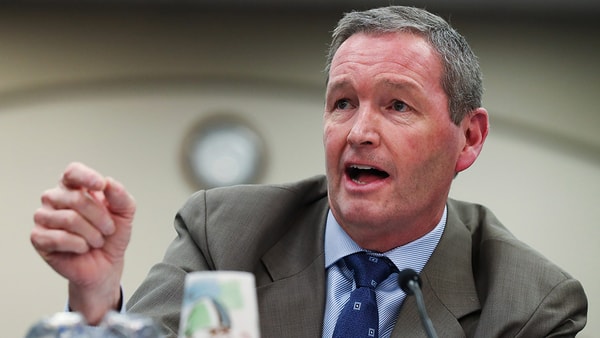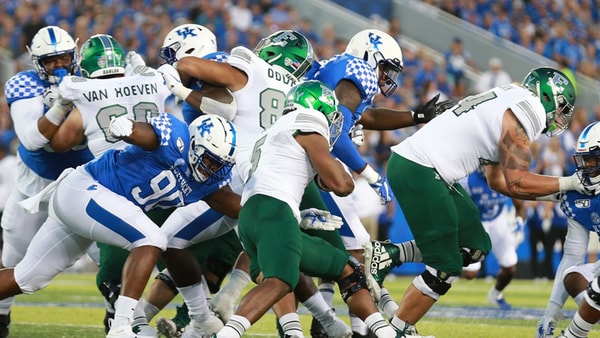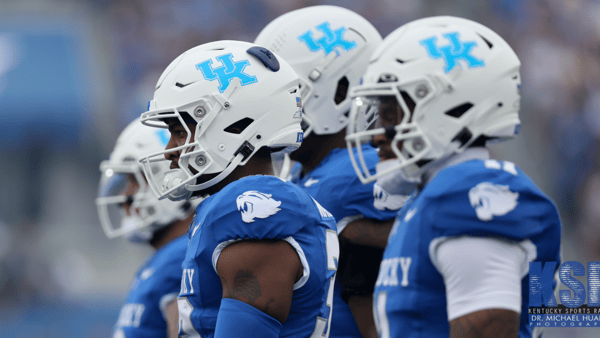[caption id="attachment_255254" align="aligncenter" width="3089"]

Photo Credit: AP, USA Today[/caption]
In the spring of 2017, the world watched in horrified fascination as a failed music festival imploded on the shores of the Bahamian island of Great Exuma. The Fyre Festival’s dramatic fall from grace made it a social media sensation, and a prime target for ridicule as society mocked the wealthy millennials who had been defrauded of tens of thousands of dollars. Last week, two rival documentaries debuted on Hulu and Netflix exploring the disastrous event and reflecting on its impact.
Fyre: The Greatest Party that Never Happened is Netfllix’s effort, while
Fyre Fraud is Hulu’s take on the subject. So, which one should you watch? Which one is the most interesting and informative? Which is better?
Netflix. Netflix's is better. Let me explain.
I should state that I watched Netflix’s documentary first, and that may have skewed my opinion of
Fyre Fraud. I should also state that I am a librarian, and, as an information professional, I enjoy watching documentaries that are designed to, well, inform. This does not appear to be Hulu’s goal. The summary of
Fyre Fraud describes it as a “true crime comedy,” and it definitely attempts to entertain by gleefully eviscerating the influencer culture that made the Fyre Festival possible. The production spent several thousand dollars interviewing Fyre’s CEO, Billy McFarland, an interview which ultimately gains them nothing.
Fyre Fraud is constantly punctuating its slim interviews with bizarre odds and ends, including snippets of public-domain cartoons and long intervals in which a robotic lady voice reads various court documents to you. These asides don’t have the comic effect the filmmakers are hoping for, and make the production feel less like a biting satire and more like a disorganized mess that needed to pad for time.
Fyre Fraud also comes off as callous and unfeeling, condemning McFarland’s millennial victims with delight. Yet it’s hard to point and laugh at the scene of young people drinking on a beachside restaurant when you’ve just watched the restaurant’s owner, Maryann Rolle, sobbing at the loss of her life savings in Netflix’s far superior effort. Hulu’s
Fyre Fraud is startlingly lacking in empathy, a necessary element in both comedy and storytelling.
[caption id="attachment_255255" align="aligncenter" width="1235"]

Credit: Netflix, Glamour[/caption]
Speaking of Rolle, Netflix’s
Fyre is a meticulously-crafted dive into the behind-the-scenes world of the Fyre Festival, an autopsy of a colossal failure that casts a critical eye on its staff (many of whom contribute in-depth, revealing interviews) and an empathetic one on the people that they victimized, particularly the Bahamians who were left unpaid after weeks of hard labor (
Fyre Fraud relegates their post-festival suffering to a footnote.). Hulu tries to discredit
Fyre late in its documentary by pointing out that the social media firm that helped promote the festival, FuckJerry, were listed as co-producers in this film.
Far from absolving the social media giants, however, the filmmakers routinely pair the developing disaster with FuckJerry’s glowing social media posts, contributing to a building sense of dread that peaks in a horrifying payoff the night of the festival. Rather than appearing guiltless, all those who were interviewed reflect on their own complicity. In addition to the interviews, the filmmakers also use fascinating footage from FuckJerry’s initial shoots, as well as phone and video calls recorded by the Fyre app’s staff. What ultimately emerges is the tale of a group of people swept up in a charismatic liar’s vision, to catastrophic effect.
Fyre Fraud also attempts to do this, but obviously with less footage and certainly with far less success.
[caption id="attachment_255253" align="aligncenter" width="2322"]

Credit: Fyre Festival Facebook Page[/caption]
There’s a moment late in
Fyre Fraud in which the filmmakers ask an interviewee who was ultimately responsible for the festival and its fallout. “Everyone,” he says, with all the self-assurance of a person who’s certain they’ve just said something profound. The Hulu documentary’s point seems to be that influencer culture, and millennials themselves, are responsible for the catastrophe because they always buy into the hype. When you finish
Fyre Fraud, you can’t help but feel that you’ve been tricked again, lured into spending your own time and money on a film that’s all flash and no substance, a film that leans upon the memes it mocks to tell its story. Netflix’s
Fyre, on the other hand, horrifies you with a mammoth amount of shocking information and leaves you to reflect on what the Fyre Festival’s success – and failure – says about our Instagram-focused culture. Hulu’s
Fyre Fraud just points and laughs.
[caption id="attachment_255257" align="alignleft" width="162"]

Credit: Farrar, Strauss, & Giroux[/caption]
By the way, if you’re interested in reading a biting (and funny) satire of millennials, check out
Severance by Ling Ma. It’s about an office drone who’s too consumed by her everyday routine to notice an apocalyptic plague. Happy reading (and watching)!

 Photo Credit: AP, USA Today[/caption]
In the spring of 2017, the world watched in horrified fascination as a failed music festival imploded on the shores of the Bahamian island of Great Exuma. The Fyre Festival’s dramatic fall from grace made it a social media sensation, and a prime target for ridicule as society mocked the wealthy millennials who had been defrauded of tens of thousands of dollars. Last week, two rival documentaries debuted on Hulu and Netflix exploring the disastrous event and reflecting on its impact. Fyre: The Greatest Party that Never Happened is Netfllix’s effort, while Fyre Fraud is Hulu’s take on the subject. So, which one should you watch? Which one is the most interesting and informative? Which is better?
Netflix. Netflix's is better. Let me explain.
I should state that I watched Netflix’s documentary first, and that may have skewed my opinion of Fyre Fraud. I should also state that I am a librarian, and, as an information professional, I enjoy watching documentaries that are designed to, well, inform. This does not appear to be Hulu’s goal. The summary of Fyre Fraud describes it as a “true crime comedy,” and it definitely attempts to entertain by gleefully eviscerating the influencer culture that made the Fyre Festival possible. The production spent several thousand dollars interviewing Fyre’s CEO, Billy McFarland, an interview which ultimately gains them nothing.
Fyre Fraud is constantly punctuating its slim interviews with bizarre odds and ends, including snippets of public-domain cartoons and long intervals in which a robotic lady voice reads various court documents to you. These asides don’t have the comic effect the filmmakers are hoping for, and make the production feel less like a biting satire and more like a disorganized mess that needed to pad for time. Fyre Fraud also comes off as callous and unfeeling, condemning McFarland’s millennial victims with delight. Yet it’s hard to point and laugh at the scene of young people drinking on a beachside restaurant when you’ve just watched the restaurant’s owner, Maryann Rolle, sobbing at the loss of her life savings in Netflix’s far superior effort. Hulu’s Fyre Fraud is startlingly lacking in empathy, a necessary element in both comedy and storytelling.
[caption id="attachment_255255" align="aligncenter" width="1235"]
Photo Credit: AP, USA Today[/caption]
In the spring of 2017, the world watched in horrified fascination as a failed music festival imploded on the shores of the Bahamian island of Great Exuma. The Fyre Festival’s dramatic fall from grace made it a social media sensation, and a prime target for ridicule as society mocked the wealthy millennials who had been defrauded of tens of thousands of dollars. Last week, two rival documentaries debuted on Hulu and Netflix exploring the disastrous event and reflecting on its impact. Fyre: The Greatest Party that Never Happened is Netfllix’s effort, while Fyre Fraud is Hulu’s take on the subject. So, which one should you watch? Which one is the most interesting and informative? Which is better?
Netflix. Netflix's is better. Let me explain.
I should state that I watched Netflix’s documentary first, and that may have skewed my opinion of Fyre Fraud. I should also state that I am a librarian, and, as an information professional, I enjoy watching documentaries that are designed to, well, inform. This does not appear to be Hulu’s goal. The summary of Fyre Fraud describes it as a “true crime comedy,” and it definitely attempts to entertain by gleefully eviscerating the influencer culture that made the Fyre Festival possible. The production spent several thousand dollars interviewing Fyre’s CEO, Billy McFarland, an interview which ultimately gains them nothing.
Fyre Fraud is constantly punctuating its slim interviews with bizarre odds and ends, including snippets of public-domain cartoons and long intervals in which a robotic lady voice reads various court documents to you. These asides don’t have the comic effect the filmmakers are hoping for, and make the production feel less like a biting satire and more like a disorganized mess that needed to pad for time. Fyre Fraud also comes off as callous and unfeeling, condemning McFarland’s millennial victims with delight. Yet it’s hard to point and laugh at the scene of young people drinking on a beachside restaurant when you’ve just watched the restaurant’s owner, Maryann Rolle, sobbing at the loss of her life savings in Netflix’s far superior effort. Hulu’s Fyre Fraud is startlingly lacking in empathy, a necessary element in both comedy and storytelling.
[caption id="attachment_255255" align="aligncenter" width="1235"] Credit: Netflix, Glamour[/caption]
Speaking of Rolle, Netflix’s Fyre is a meticulously-crafted dive into the behind-the-scenes world of the Fyre Festival, an autopsy of a colossal failure that casts a critical eye on its staff (many of whom contribute in-depth, revealing interviews) and an empathetic one on the people that they victimized, particularly the Bahamians who were left unpaid after weeks of hard labor (Fyre Fraud relegates their post-festival suffering to a footnote.). Hulu tries to discredit Fyre late in its documentary by pointing out that the social media firm that helped promote the festival, FuckJerry, were listed as co-producers in this film.
Far from absolving the social media giants, however, the filmmakers routinely pair the developing disaster with FuckJerry’s glowing social media posts, contributing to a building sense of dread that peaks in a horrifying payoff the night of the festival. Rather than appearing guiltless, all those who were interviewed reflect on their own complicity. In addition to the interviews, the filmmakers also use fascinating footage from FuckJerry’s initial shoots, as well as phone and video calls recorded by the Fyre app’s staff. What ultimately emerges is the tale of a group of people swept up in a charismatic liar’s vision, to catastrophic effect. Fyre Fraud also attempts to do this, but obviously with less footage and certainly with far less success.
[caption id="attachment_255253" align="aligncenter" width="2322"]
Credit: Netflix, Glamour[/caption]
Speaking of Rolle, Netflix’s Fyre is a meticulously-crafted dive into the behind-the-scenes world of the Fyre Festival, an autopsy of a colossal failure that casts a critical eye on its staff (many of whom contribute in-depth, revealing interviews) and an empathetic one on the people that they victimized, particularly the Bahamians who were left unpaid after weeks of hard labor (Fyre Fraud relegates their post-festival suffering to a footnote.). Hulu tries to discredit Fyre late in its documentary by pointing out that the social media firm that helped promote the festival, FuckJerry, were listed as co-producers in this film.
Far from absolving the social media giants, however, the filmmakers routinely pair the developing disaster with FuckJerry’s glowing social media posts, contributing to a building sense of dread that peaks in a horrifying payoff the night of the festival. Rather than appearing guiltless, all those who were interviewed reflect on their own complicity. In addition to the interviews, the filmmakers also use fascinating footage from FuckJerry’s initial shoots, as well as phone and video calls recorded by the Fyre app’s staff. What ultimately emerges is the tale of a group of people swept up in a charismatic liar’s vision, to catastrophic effect. Fyre Fraud also attempts to do this, but obviously with less footage and certainly with far less success.
[caption id="attachment_255253" align="aligncenter" width="2322"] Credit: Fyre Festival Facebook Page[/caption]
There’s a moment late in Fyre Fraud in which the filmmakers ask an interviewee who was ultimately responsible for the festival and its fallout. “Everyone,” he says, with all the self-assurance of a person who’s certain they’ve just said something profound. The Hulu documentary’s point seems to be that influencer culture, and millennials themselves, are responsible for the catastrophe because they always buy into the hype. When you finish Fyre Fraud, you can’t help but feel that you’ve been tricked again, lured into spending your own time and money on a film that’s all flash and no substance, a film that leans upon the memes it mocks to tell its story. Netflix’s Fyre, on the other hand, horrifies you with a mammoth amount of shocking information and leaves you to reflect on what the Fyre Festival’s success – and failure – says about our Instagram-focused culture. Hulu’s Fyre Fraud just points and laughs.
[caption id="attachment_255257" align="alignleft" width="162"]
Credit: Fyre Festival Facebook Page[/caption]
There’s a moment late in Fyre Fraud in which the filmmakers ask an interviewee who was ultimately responsible for the festival and its fallout. “Everyone,” he says, with all the self-assurance of a person who’s certain they’ve just said something profound. The Hulu documentary’s point seems to be that influencer culture, and millennials themselves, are responsible for the catastrophe because they always buy into the hype. When you finish Fyre Fraud, you can’t help but feel that you’ve been tricked again, lured into spending your own time and money on a film that’s all flash and no substance, a film that leans upon the memes it mocks to tell its story. Netflix’s Fyre, on the other hand, horrifies you with a mammoth amount of shocking information and leaves you to reflect on what the Fyre Festival’s success – and failure – says about our Instagram-focused culture. Hulu’s Fyre Fraud just points and laughs.
[caption id="attachment_255257" align="alignleft" width="162"] Credit: Farrar, Strauss, & Giroux[/caption]
By the way, if you’re interested in reading a biting (and funny) satire of millennials, check out Severance by Ling Ma. It’s about an office drone who’s too consumed by her everyday routine to notice an apocalyptic plague. Happy reading (and watching)!
Credit: Farrar, Strauss, & Giroux[/caption]
By the way, if you’re interested in reading a biting (and funny) satire of millennials, check out Severance by Ling Ma. It’s about an office drone who’s too consumed by her everyday routine to notice an apocalyptic plague. Happy reading (and watching)!







Discuss This Article
Comments have moved.
Join the conversation and talk about this article and all things Kentucky Sports in the new KSR Message Board.
KSBoard